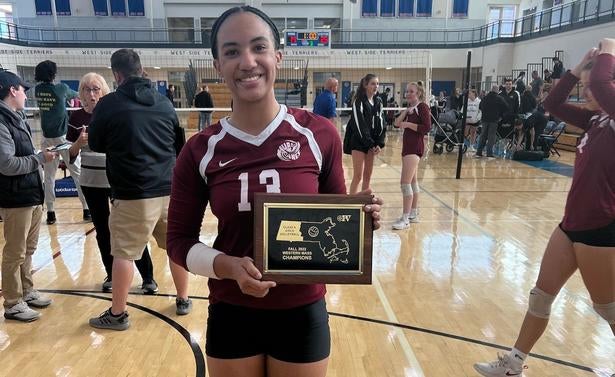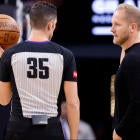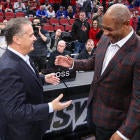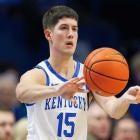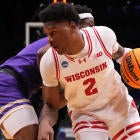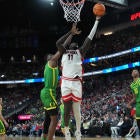
Frank Martin walked into a North Miami dealership, determined to buy his first dream car: a triple white Volkswagen Rabbit Cabriolet.
It's spring of 1988. The 22-year-old Martin has money for the first time in his life. His primary job is substitute teaching that pays $60 per day. He's also a junior varsity basketball coach. Then there's the rotating assignment at a bar/restaurant that has him working as the short-order cook, tending bar or being muscle at the door — $100 a night as the bouncer.
You know how at car dealerships the sales staff has desks, but they're also interchangeable and customers randomly sit at them while haggling over price and terms? That's what happened to Martin as he was talking to a salesman. It wasn't that guy's desk.
He knew that once he saw the pictures on it.
"I'm like … that looks like my sister," Martin remembers.
And there's another photo.
"Shit, that's me," Martin says. "What the hell?"
He sees the nameplate seconds later, staring him in the face: FRANK MARTIN.
Can't be. His eyes start to dart around the dealership. And there he is, 20 yards away.
"I got up and left," he says.
That was the last time Frank Martin saw his father.
A critical moment materialized right then, and it was about a lot more than a dead relationship with his dad. It was something that reinforced Martin's code of belief, a dogma that would shape his life, career and bring us to this story. His image is attached to many aesthetics, but for Martin, nothing defines him more than family. Nothing comes close.
But, there have been struggles. His family's challenges are not unique. In fact, that's the point. Those challenges are often the uncomfortable reality of what many basketball households go through in an industry that catalyzes change at a hyperactive rate.
AMHERST, Mass. — Here in 2022, the 56-year-old Martin is off to an encouraging start as he attempts a UMass basketball revival. The seven-year-old practice facility has a primary hallway with a 40-foot ceiling that runs alongside the men's and women's courts and is decorated with reminders of the '90s glory years under John Calipari.
Martin came here after a decade at South Carolina, the apex being that bolt-from-the-blue Final Four in 2017, his only NCAA Tournament appearance with the Gamecocks. After rumors swirled in 2021 he'd be fired, Martin staved off one more year and was dismissed this past March following an 18-13 season.
He's on pace to best that record in a tougher Year 1 situation at UMass. The Minutemen are 9-3. It's the program's most encouraging start since 2013-14, the last time it made the Big Dance — and the only time since 1998. In addition to his famously clamorous approach to coaching, with nearly 300 wins and that Final Four to his name, Martin was brought in to end the mediocrity and supply sustained excitement back in Amherst. He may well do it.
On this practice day, he's in typical form. Martin hasn't lost any of the flammable passion that's made him one of the most well-known coaches in college sports. He dons a black cap and black polo shirt above his roomy gray sweats that droop over his black sneakers. He's still bald — hairless, in fact, a bewildering effect from one of his two previous brutal bouts with COVID-19. Martin's voice booms off the walls, a pissed off man joyfully in his element.
"If you're going to stand there and watch, buy a f---ing ticket the day we play the game."
"Can you like, look, before you do anything? Please?"
"F---, I'll tell you they never made a worse basketball player than me. But that shit never rolled through my legs."
"WHO'S RESPONSIBLE FOR THE SHORT ROLL???"
He flips from "yessir!" to "goddammit!" in a second's time when a 5-on-5 drill dies on a turnover.
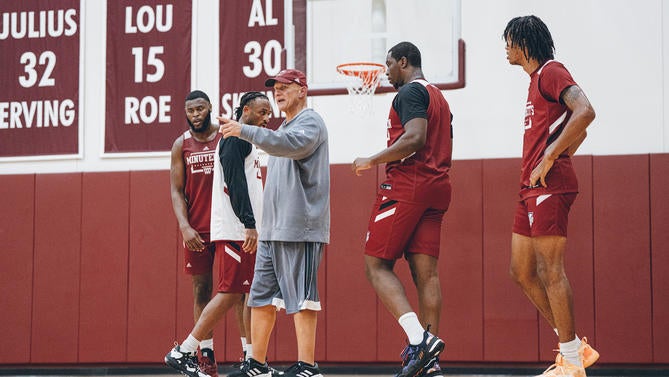
It's a spirited practice. Martin is fluctuating; he's still trying to envision how good this team can be.
The spring and summer months were taxing on his psyche for reasons beyond basketball — but directly tied to it. Focused as he is on the task, dogged as he is to restore the luster to UMass, there's a deeper story to tell, a story Martin felt an urge to speak on. He doesn't want to be glorified in his attempt to rebuild a program. He wants people to know there's an unseen reality for many families in sports, how taking jobs isn't always some magical new journey.
We're less than a mile from campus, and with an Athena's Pizza tuna grinder at his chest, Martin looks out the window and thinks back to being 8. That's when his father left the first time. He left for good when Martin was 10. Twelve years later, the universe handed him a choice at that car dealership. He didn't take kindly to it. Martin didn't see an opportunity to connect with his dad. He saw a reminder that he'd never live his life like the man he was dodging as he got the hell out of building.
"He was not a good husband, not a good dad," Martin says. "My mom and him remarried after the first time he left, and it lasted less than a year. After that, when he left I never spoke to him again."
"Courage" has different meanings for different people. For Martin, the definition comes from those who raised him. His grandmother, Ernestina. His mother, Lourdes.
"Both tough as nails and stronger than new rope," he says.
In Martin's mind, he's still living to get to their level.
College coaching has inevitably become an industry ornamented with huge contracts, increased fame and a parade of perks and benefits. The exchange: pressure heavier than ever to win at oft-unreasonable levels. The stresses that come with the job sometimes inflict emotional and mental torment on coaches' families. It's something often discussed privately among coaches and among their spouses, but rarely talked about publicly.
The Martins want to change that, if even a little.
Frank and his wife, Anya, have three children: Brandon, 24; Amalia, 17; and Christian, 15. If you think taking this job was Frank's decision, you'd be wrong. He said it was a family choice that required a unanimous vote. The reasons are varied for why change can be so difficult for families in college sports, but they're often deeply rooted and sometimes come with a build-up of tension that festers for years before a job tie is severed.
"That's the part that very few people understand," Martin said. "Everyone thinks, because we get paid a lot of money … change? What's he complaining about? What can be so hard in his life?"
Because of how he was raised (a child of Cuban immigrants and constantly swapping living quarters), Martin did not want to live a life of constant turnover when he became a father. They moved to Manhattan, Kansas, in 2006 when he was offered an assistant's post at K-State. The Martins lived there until 2012, only leaving because of a public falling out he had (after becoming head coach and taking K-State to the Elite Eight) with the athletic director. A door opened in South Carolina. He hoped they'd make it at least a dozen years there, if not longer. But few ever last that long at one place in this profession.
"Basketball season is always really hard because Dad's always gone," Amalia said.
Ironically, the 2017 Final Four run steered Martin's program off-course in unanticipated ways and led to a maelstrom over his final two-plus years in Columbia.
"I was like, 'Frank, this should be easier, not harder,'" Anya remembers. She started to notice small changes, then signs would become more obvious. Not wanting to concern their children, Martin would shield as much negativity as he could from coming into the home.
It became an unwinnable fight that played out slowly and against the backdrop of the pandemic. South Carolina had a starter leave because of a health condition, multiple coaches got sick for long stretches and Martin says the team lost more practice time than any high-major program. The first time Martin (who had a near-death experience in 2006) caught COVID, it felt so dire, they updated his will.
"At that time everyone was dying and we had to get our affairs in order," Anya said. "We're literally life-and-death scared."
He recovered, then began to lose his hair. As the 2020-21 season opened, the basketball situation deteriorated. Anya knew Frank wasn't happy; he rarely complains to her, so if he's vocalizing displeasure, something really must be amiss.
"Just come tell me. I don't need to find out on the street," Martin said. "After 10 years I've given them the winningest years in the history of the school. And I do things right, I don't cheat in the world. My guys all graduate, all go to class, they don't get arrested, there's no issues. Just call me in and say, 'Frank.' Treat me like a man, that's all I ever asked. So my kids knew that scarred me."
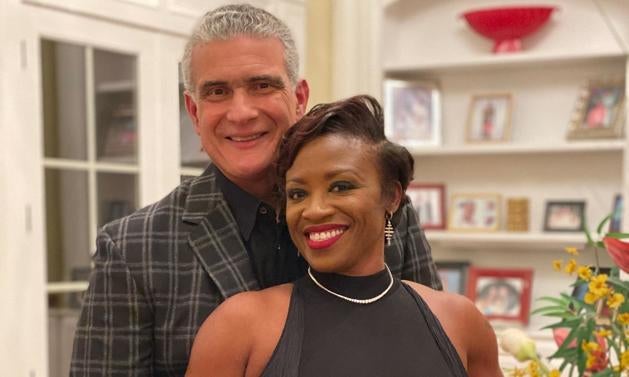
Martin revealed to CBS Sports that significant efforts were put into motion to attempt to fire him in 2021.
"They tried, but they couldn't," he said. "The negativity got so big, because people on the inside were leaking stuff to the media about me getting fired. Once you create that negative energy, anything short of an NCAA bid, you're not changing it."
Martin coached his final season there knowing he was a lame duck. In January he told his family change was coming — by his hand or the school's. He was fired March 14. South Carolina paid him $3 million to go away.
"That money ain't helping my daughter," Martin said.
UMass was logical, sentimental choice
How it ended at South Carolina was not going to keep Martin from immediately being an attractive candidate at a number of schools.
"When the moment came, it was really complicated," Martin said. "I wouldn't talk. I had four schools call me that I had no interest in."
The one he was interested in: UMass. Athletic director Ryan Bamford was patiently diligent. Martin was torn. Yes, he wanted to coach again and if that could be within weeks, great. But he had teenage children doing well in school and he had guilt over whether he should be selfish about his career in some of their most formidable years. He wasn't taking the job unless everyone said yes, and he wouldn't push the issue. Coaching for a year with anyone staying behind in Columbia was not an option.
"I'm not living away from my family, I'm not," Martin said. "The job pulls me away as it is. Everyone says to me all the time, 'So what do you do other than coach?' I spend time with my family. 'No, really, what do you do?' I spend time with my family. My dad was an absentee father. He got up and left and he never supported my mom or me and my sister. I'm not doing that."
Making matters more interesting: Anya was a track standout at UMass in the '90s and got involved in the program in recent years. Her name and picture is part of the team's facility. The fit for Frank would seem to make even more sense, but it wasn't that simple. Anya wouldn't let her feelings on the job be known until Frank decided independently whether he wanted to take it. She wanted him to pursue it for the right reasons, not sentimental ones.
After a spate of conversations that lasted almost a week, at 10 p.m. on March 24, the night he took the job, they had one final family heart-to-heart. Frank wasn't saying yes unless everyone was at peace with it, and it seemed like they were. Amalia hadn't been in a normal classroom for the better part of two years, anyway. She was eyeing prestigious colleges in the northeast, too.
"You want him to be excited about the way he [does his job] because then he's gonna be a great person to be around," Amalia said. "I wanted to support him, that's why I told him that and I truly believed that at the time."
"I went to my wife. I said, 'What do you think?'" Martin remembers. "Because at the end of the day, my wife's been down there for 10 years. I'm asking her to uproot. And yes, she went to college here and all that's great and awesome, but it was college in the mid-90s. It's 2022."
He wanted to be where basketball is priority, where it's front page, where there's a fire in the belly of the community. He wanted new roads to drive on, to feel good going into work again. Anya finally said she was in. She believed Frank was moving forward for the right reasons. He took the job minutes after midnight. He flew up the next day. At first, it was good. The joyous press conference, meeting with dignitaries, great dinners, building a staff.
But soon enough, with Anya back in Columbia and the kids finishing school, crisis hit. With Frank continually away from his family for an extended period of time for the first time, things got worse.
"My wife called and said we've got a problem," Martin said.
The kids had changed their minds. Didn't want to leave Columbia. Yet: the contract had been signed. The confusion, the teeth-grinding parental irritation — and the guilt — arrived simultaneously. Martin had trouble doing the job to the level he kept himself accountable to.
"When she (Amalia) turned, in my head I'm like, goddamnit," Anya remembers. "I was waiting for the shoe to drop. I was ready, and when it didn't drop, I thought we dodged a bullet. And then when it did drop, I was really mad at first. I wanted to go up to that school and rip them a new one."
The school. As it turns out, a track coach, a teacher and even the assistant principal apparently expressed the same message to Amalia: We're really happy for your dad, but he's not going to make you move your senior year, right? You're not going to leave us, right? That would be so selfish of him. One faculty member even shared a personal anecdote of how they were forced to move as a junior in high school and still didn't forgive their parents to this day.
"It changed her in a negative way," Anya said. "Everything was negative, everything was bad, shut-down city. I was lost. Frank was already gone. At that time, it seemed like the kids did a 'we're going to team up on Mom' kind of thing. Everything was a fight. ... Everything was on 1,000."
"Columbia, South Carolina, is the polar opposite of Amherst, Massachusetts," Martin said. "Even though we prepared, it finally hit her."
Anya said her family was challenged in ways it never had been before, noting circumstances hit a boiling point in late spring. Being more than a thousand miles away, Frank felt helpless.
While moving from one city to another is of course a far cry from a health scare or life-threatening event, it nonetheless amounts to trauma for many young people — and some older people, too. This is the heart of the matter, the reality behind the glory of getting a big coaching job with an enviable salary. The highs are sweet, but a debt is often paid on an emotional level that's seldom seen. In sharing their story about this, the Martins want people to know that these life changes coaches sign up for, and what their children are born into, deserve a bit more humanization.
"I learned a lot about my kids during that time," Anya said.
'Faith and trust always in family'
Improvement slowly came with transition and in dosages in the offseason. Some families need months for these adjustments. The mental health impacts can go deeper than surface-level discomfort over moving to a new state.
"One thing, especially in college towns, everyone's going to know who you are," Amalia said.
People she doesn't know approaching her on the street. I've heard so much about you! You're coach Martin's kid.
"And you're just kind of like, I've never seen you before in my life," she said. "We moved so fast, they only took three days [to empty the house]. That was very abrupt. So, you're still kind of, like, dealing with that. And then coming into, 'Hey, I know you,' which is terrifying."
There were days over the summer and fall, even as circumstances improved, when the Amherst adjustment found some stalls. Martin had conflicting emotions as he was still working his way into comfort at a new job. There were times when building a roster felt minuscule compared to issues at home.
"There's moments on eggshells because I get home, and I can feel the tension," Martin said. "The easy thing for me to do is say, 'I don't want to hear it. We all had these conversations. Stop. It is what it is.' But I can't do that. It's not fair to them. My wife gave up her career to help me chase money. When we met, she made more money than me. She would have been a school administrator at a high level, whether on a campus or in athletics, one or the other. She's more educated than I am. She's got a master's degree. And she gave it all up to help me chase my career."
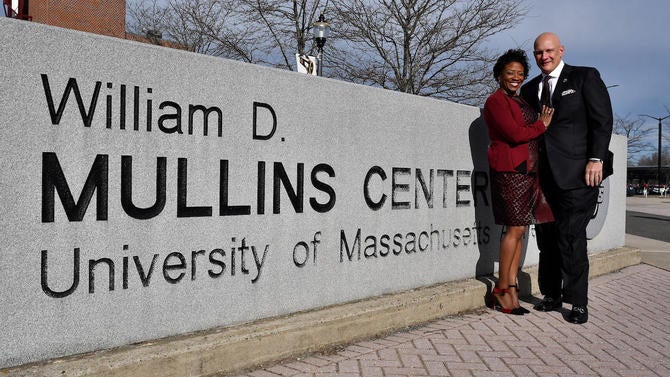
For Anya, with her own prideful history at UMass, there was also the peculiar feeling of going back to a place she hadn't been in two-plus decades. She reconnected with the women's track team in recent years, but there were no relationships existing from her time as an undergrad.
"I went to school here, I didn't live here," she said. "Now I'm trying to figure out what my purpose is."
It was so foreign early on, the family's realtor became her closest friend in the area. But what's helped in this transition is looking back to nine months ago. Anya remembers how unhappy she saw her husband become and what some nights at the dinner table felt like. She thinks about the bigger things, like Frank's health, which has improved after a separate scare with his heart in September 2021.
"They're content. They're not 100% happy, but they're not miserable, thank god," Anya said of her kids. "They like it here more than they admit. I'm a mother, I know."
In recent weeks, as the season's moved along, things have turned for the better. In reporting this story, it also felt like talking about this was part of the family's healing process.
"My youngest son is at peace," Martin said. "I still worry about him. But he adapts to everything."
Amalia is too humble during our interview to speak extensively on her talent as a volleyball player, though she credits the sport for being the biggest factor in helping her — and thus, the family — make this move easier.
"Volleyball has really helped, even kind of forced me to adjust, in a good way," she said.
"She's in a good place right now," Martin tells me. "[It has] given the rest of us a joy to accept and manage change. Change is complicated. If you don't manage change, it's really hard to enjoy anything. If you can't enjoy your family while dealing with change, it makes it really hard."
After his father left, Martin's grandmother fostered a culture in their home that shaped him. It was all about "be good today." Worry about today and only today. Family first, and always come home. It's the way he constructed himself as a husband, father, coach. It's why he's carried more guilt and consternation around than most realized since taking this job.
"My faith and trust is always in family," he said. "It's like that with my family and my extended family, which is my team. I think my children are the same way. My team has our own internal struggles but we're fighting to understand each other, and having success with how we're doing it has given me peace to handle the next day."
At least for now, things have begun to work out. UMass' fan base is enlivened at what's transpired through the first seven weeks. It took Martin years to get South Carolina into competitive form in the SEC; it doesn't seem like the wait will take as long here. Almost two months in, this season is resembling his first year at Kansas State, when he won 21 games and made the 2008 NCAA Tournament.
Martin brought nine new players aboard, practically a mandatory roster flip after the Minutemen went 15-17. In Northeast basketball circles there remains a belief UMass can return to sustained competitive relevancy, particularly with Boston College mired in a rut that's gone on well over a decade. With the Atlantic 10 in the midst of a down season, there's an opening for UMass to move up. The team is spotty offensively, but its defense — long the calling card of Martin's coaching methodology — is paying immediate dividends and giving this group a shot heading into 2023.
Is another Marcus Camby (easily findable along that decorated hallway in the practice facility) coming later this decade? Almost certainly not. But there's only one active A-10 coach who's led a program to a Final Four. His address is registered in Amherst and he rocks sweatpants to practice. If there's someone who's capable of getting Massachusetts hoops regularly back in the March conversation, it's Martin.
"The players have made it fun for me," he said.
And for Christian and Amalia, it's been the surprises along the way, the ones outside of sports.
"That's kind of like a light at, not at the end of the tunnel, but in the tunnel, you know?" Amalia said.
There's a dichotomy to Frank Martin that a lot of people don't see. He's got the most intimidating stare in college sports, but when you get to know him, he's acutely aware of his emotions and of those around him. Easy (and inaccurate) as it is to diagram him as this brutish two-dimensional character because of his look and volume, Martin is a lot more than a good coach with a drill sergeant's power of articulation.
He maintains he's at UMass not because chased it, but because his family allowed this. Any other route would have been a setup for disappointment.
"If I would have handled it like that, I'd probably be sitting here regretting taking the job," Martin says as he finishes lunch. "I have anxiety in managing the conversations to hold it together for my family. My faith is what I believe, that I've been through an unbelievable roller coaster as a human being, in life. And somehow, some way, every time I've been in a difficult moment, something great has happened in the near future. And I don't know if this is going to be like all the other chapters in my life, but that's where my faith is at."
A family in progress. Just know there are many like them across college sports.
"This is a difficult moment that we're going through, what's going to make us closer together as a family," Martin continued. "At the end, it's going to be an unbelievable experience. For me, for my wife, it's gonna be an unbelievable experience for my daughter, because she's going to finally get the recognition she deserves as a volleyball player. And she's going to be able to go to college where she wants and we're going to win games, which is going to give me professional peace. And at the end there's going to be health and serenity in my home. The difficulty of this moment is going to help all of us better understand one another. I truly believe in that."
As Christmas approaches, Frank and Anya say they've hit their best stretch yet in this new place. New roads to drive on can refresh the soul. Martin did wind up buying that triple white VW Rabbit back in '88 — his dream car, after all — he just got it at a different dealership. These days he gets behind the wheel of a Ford Explorer. A few weeks back he drove it to meet his family at one of Amalia's volleyball matches. That night, she had some cargo to carry into the new family home, something to decorate their own walls with.
The recently named Western Mass Girls Volleyball Player of the Year had just led Amherst High to one of its best seasons ever — Class A champions.
